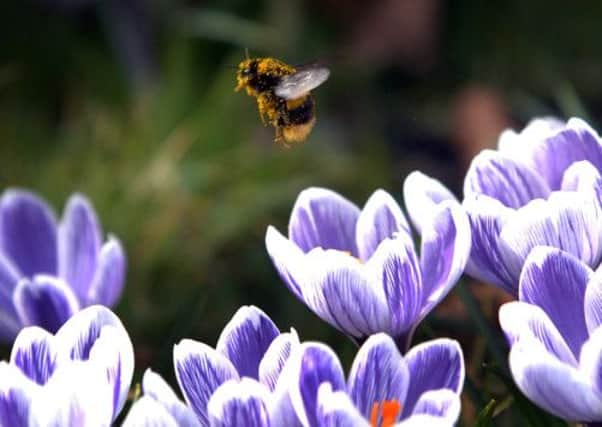Urgent action plea to protect bees


MPs had accused Ministers of taking an “extraordinarily complacent approach” to protecting bees and insects which perform an important role pollinating crops.
A report of the parliamentary Environmental Audit Committee called for a moratorium on the use of three neonicotinoid pesticides on crops such as oil seed rape which bees feed on to be introduced by the beginning of 2014.
Advertisement
Hide AdAdvertisement
Hide AdPrecautionary action was necessary now to protect insects such as bees, moths, butterflies and hoverflies, many of which are suffering declines in numbers in the UK, the report said.
A spokesman for Defra said: “We are doing a lot of work to safeguard bee health, such as the Healthy Bees Plan for honeybees, work on habitats and support for bee-friendly farming through agri-environment schemes and research funding.
“Decisions on neonicotinoids must be based on sound scientific evidence.
“That’s why we want the European Commission to agree to our suggestion for a major new field study to get the best, most up-to-date evidence.
Advertisement
Hide AdAdvertisement
Hide Ad“That will allow informed decision-making, rather than rushing into a knee-jerk ban based on inconclusive studies.”
Concerns have been raised over possible damage to bees from exposure to neonicotinoids, with research suggesting immediate or long-term effects on bee colony survival and development.
The parliamentary Environmental Audit Committee also wants their use in private gardens and places such as golf courses banned immediately to create “an urban safe haven for bees”.
Its report called for greater openness from pesticide companies, who use arguments of commercial sensitivity to keep data secret, so that their research into the environmental impacts of chemicals could be scrutinised, while clearer targets were needed to reduce reliance on pesticides.
Advertisement
Hide AdAdvertisement
Hide AdThe European Commission wants to restrict the use of certain neonicotinoids so they cannot be used on crops that are attractive to bees, but the UK Government has said the move is not backed by evidence.
The UK has urged the commission to wait for the results of a Government-commissioned field study on bumblebees in the past, yet that study did not show conclusively that there was a major impact on the insects from the pesticides.
But the parliamentary Environmental Audit Committee’s report yesterday concluded that the research was “fundamentally flawed” and should not be used as a basis for inaction.
The MPs also said that when scientific evidence was incomplete or contradictory, Defra should take precautionary action rather than maintaining the status quo while waiting for further evidence.
Advertisement
Hide AdAdvertisement
Hide AdEnvironmental Audit Committee chairwoman Joan Walley said: “Defra seems to be taking an extraordinarily complacent approach to protecting bees given the vital free service that pollinators provide to our economy.
“If farmers had to pollinate fruit and vegetables without the help of insects it would cost hundreds of millions of pounds and we would all be stung by rising food prices.
“We believe that the weight of scientific evidence now warrants precautionary action, so we are calling for a moratorium on pesticides linked to bee decline to be introduced by January 1 next year.”
This would allow farmers to use treated seeds which have already been bought for the coming growing season, she said.